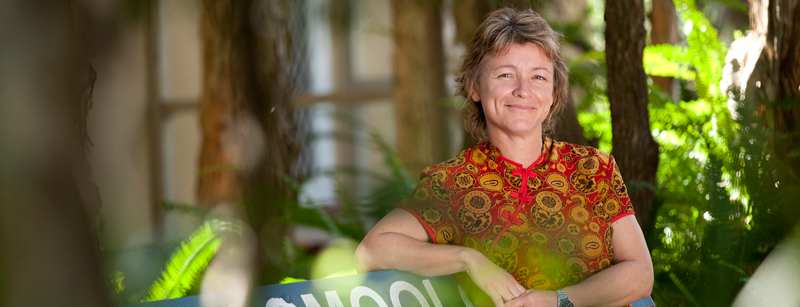Researcher Highlights
Reassessing socialist education
Dr Zsuzsa Millei
Dr Zsuzsa Millei urges a rethinking of educational theory and practice that cuts through ideological preconceptions.
 When the Cold War thawed two decades ago, former socialist states of Eastern Europe were quick to dispense with many of the hallmarks of their old regimes in their rush to emulate the West. In some
countries, that included the partial or full dismantling of state-controlled, universal public education.
When the Cold War thawed two decades ago, former socialist states of Eastern Europe were quick to dispense with many of the hallmarks of their old regimes in their rush to emulate the West. In some
countries, that included the partial or full dismantling of state-controlled, universal public education.
As a child growing up in Hungary, Dr Zsuzsa Millei experienced education under a socialist government. Now, as an early career comparative education researcher specialising in early childhood, she argues that elements of those models have been too readily dismissed in the post-socialist era and warrant reappraisal as part of the global debate on expanding opportunity and equity in education.
"I am very passionate about bringing to light the practices, theories and applications of alternative systems that have potential to solve some of the issues we are struggling with today in early childhood education," says Millei, who is part of a research program funded for two years within the Educational Research Institute Newcastle (ERIN) that aims to build on a growing cluster of research expertise in comparative and international education.
Initially psychology-trained, Millei moved into the education field after leaving Hungary, studying first in Canada then completing a doctorate in Western Australia that focused on the conception of 'the child' through the history of early childhood education in that state. A move to the University of Newcastle in 2008 ignited an interest in comparative education, which she has continued to develop from a critical stance, drawing on her interests in education, politics and sociology.
Millei has closely studied the education systems of both Hungary and Slovenia, where many elements of the school structures that existed under socialism remain. Her research has also extended into Latvia and Lithuania.
"Hungary has a very extensive system of early childhood education, so it makes an interesting case study at a time when there is a drive in western countries for more widespread and higher quality education at preschool level," she says.
Millei attributes high participation rates in early childhood education in Hungary to the large investment the socialist government made into the development of a universal system of education for children aged from three to six. There, a full-day format is offered five days a week, integrated with health and social welfare programs. She argues there is also higher regard for the role of early childhood educators and a general acceptance of education starting in preschool.
"Comparative education is not about comparing systems in a competitive sense - it encourages a broad view that considers the potentially useful elements of all educational models," she says. "Within that context, it can be useful to reinvent tools of the past that might have fallen out of favour."
Millei shares her academic interest in socialist education with colleague Dr Tom Griffiths. The pair collaborated on the editing of the book Logics of Socialist Education: Engaging with Crisis, Insecurity and Uncertainty, which will be published in August this year.
Millei has broad research expertise across a range of fields in education and her published work reflects this versatility, encompassing articles on early childhood education practices, classroom discipline, political concepts in education and pedagogical discourses under different ideological regimes.
The University of Newcastle acknowledges the traditional custodians of the lands within our footprint areas: Awabakal, Darkinjung, Biripai, Worimi, Wonnarua, and Eora Nations. We also pay respect to the wisdom of our Elders past and present.
